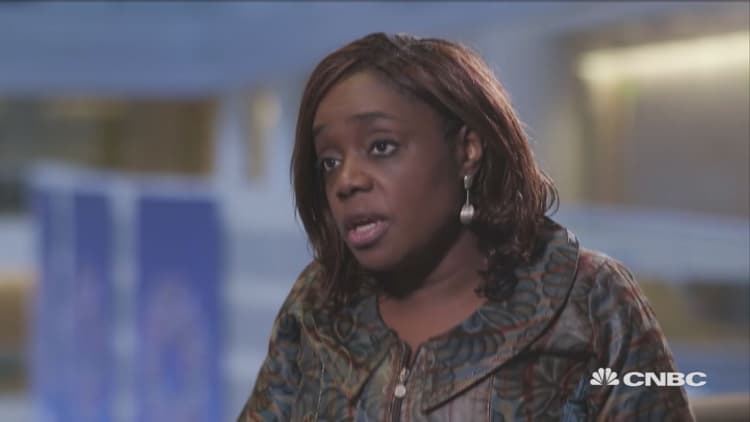
Nigeria won't get out of a recession as a result of OPEC's actions and instead must focus on implementing the right type of economic policies, Finance Minister Kemi Adeosun told CNBC on Wednesday.
Speaking to CNBC on the sidelines of the International Monetary Fund and World Bank spring meeting in Washington, the minister pointed out that, oil revenues account for around 10 percent of Nigeria's overall GDP (gross domestic product). Therefore, Adeosun argued, the implementation of domestic policies would hold the key to a long term economic recovery.
"I'm not sure that I agree that OPEC is the reason that we will get out of recession. We will get out of recession because we are following the right type of policies. Our objective is not just to get out of recession, our objective is to grow and grow sustainably," Adeosun said when asked about Nigeria's policy implementation.
Nigeria's long-term reliance on oil has caused economic pain in recent years as internal problems meant the country was unable to match its historic production levels. This proved to be a key factor in the west African country securing exemption from OPEC's landmark 2016 deal to curb a global supply overhang.
OPEC agreed to slash output by around 1.2 million barrels per day (b/d) from January 1 for six months in order to remove a supply glut. Eleven other non-OPEC countries, including Russia, subsequently agreed to limit supply by half as much.
Stable oil price 'gives us the ability to plan'

Brent crude has soared by around 19 percent since OPEC decided to reduce output and analysts at both Goldman Sachs and Citigroup forecast oil prices to return to the mid $60s by year end.
"We very much are benefitting from the improved oil price, you know it went as low as $28 a barrel. So the region that it is in at the moment, it gives us the ability to plan. What we didn't need was volatility, we need much more stability which the OPEC deal has given us," Adeosun added.
When asked how critical it would be for the oil producing cartel to extend an output reduction deal beyond June, Adeosun said the "general consensus" among oil producers was stability around the $60 a barrel mark would be a necessary milestone.
"I'm confident that all the players involved know that we need stability," she added.
—CNBC's Gemma Acton contributed to this report.



